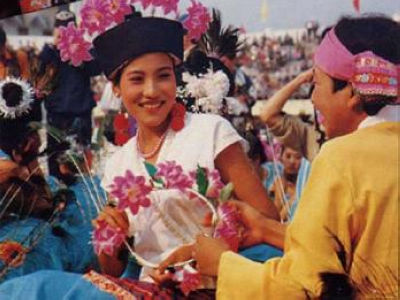Marriage customs of Bonan people in China

A Bonan wedding usually takes place on a Sunday morning according to the Hui calendar. Under the matchmaker's guidance, the groom heads to his bride's home. The bride's father then announces the start of the formal wedding ceremony, using the groom's "pet" name. The Imam chants from the Quran and showers those watching the ceremony with red dates and walnuts, which symbolize happiness.
When the convivial merriment subsides, the bride's family invites wedding guests to sit at the table arranged on the top of the kang (heatable brick bed). Young male residents of the bride's village then ask the groom's family and guests for "lamb money." If they are dissatisfied with the amount received, they plaster the guests' faces with black ash. A free-for-all then ensues, in which relatives of both the bride and groom blacken one another's faces as they exchange congratulations.
The bride prepares to set out for her husband's home when the wedding is in full swing. Before she leaves, the young men from her village ask the matchmaker for "lamb money." He makes a great show of giving only a small sum or nothing at all, which raises another storm of merriment. The ritual ends when he relents and hands over the cash.
An elderly relative or family friend of the bride performs a special ritual as the bride leaves. Carrying a plate of five-color corn in her right hand, she and the bride walk slowly, hand-in-hand, from the bride's bedroom to the gate. At each step the bride sprinkles a handful of corn in a prayer for blessings on her family. Upon reaching the gate, the veiled bride mounts a horse and heads for the groom's home.
As the procession approaches its destination, the bride's elder brother meets her. He and the groom's relatives make a show of obstructing the bride's nuptial procession, another ritual enjoyed by all.
As relatives and friends sit down and enjoy the dishes served at the nuptial banquet, the bride refuses to eat a bite for three days. Tradition demands that she wait for the food that her family sends her. The ritual ensures that the bride never forgets the love and kindness her parents lavished on her from her birth.
 0
0 






